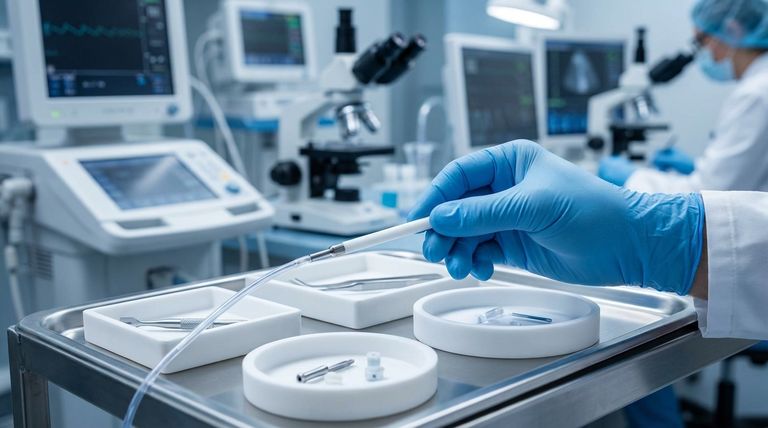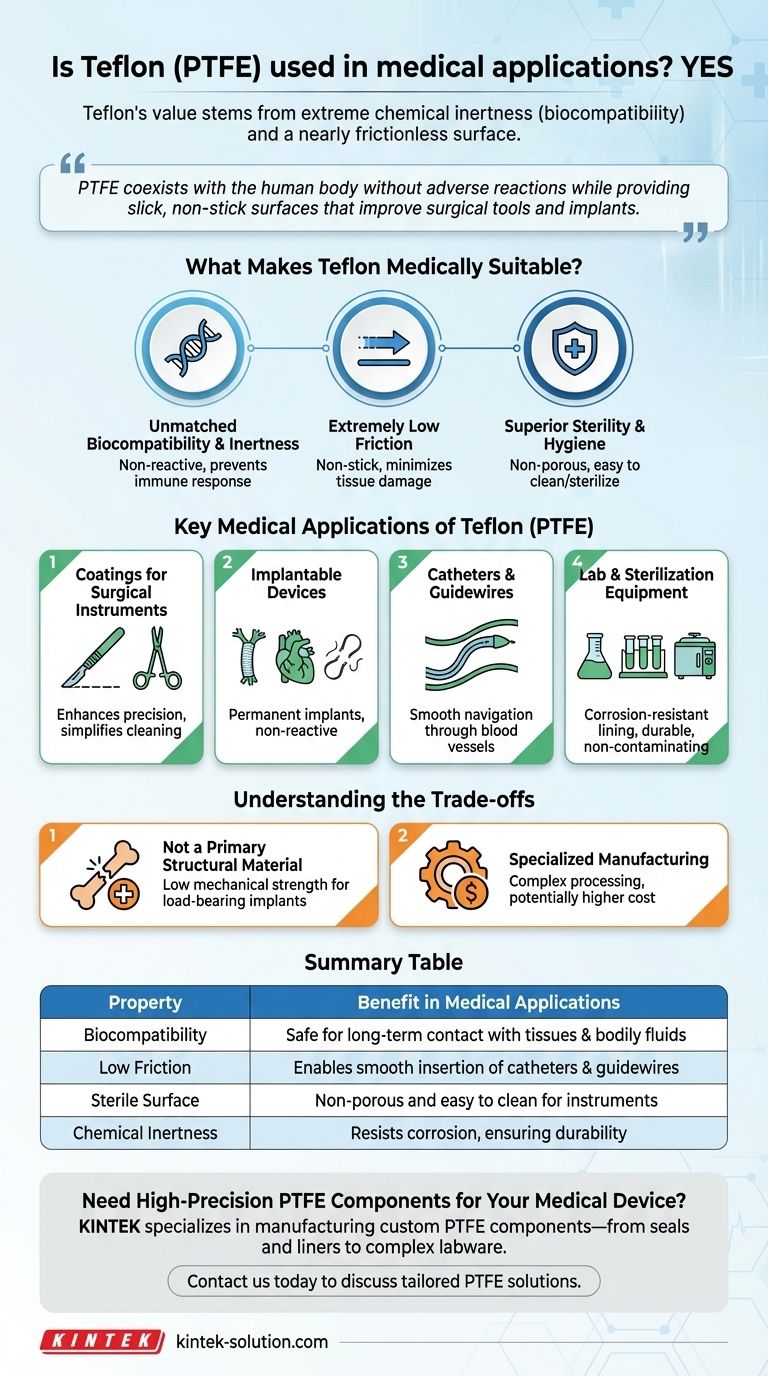Yes, Teflon is widely used in a variety of critical medical applications. Its value stems from a unique combination of properties, most notably its extreme chemical inertness, which makes it highly biocompatible, and its exceptionally low coefficient of friction, creating a nearly frictionless surface.
The core reason Teflon, or Polytetrafluoroethylene (PTFE), is so valuable in medicine is its ability to coexist with the human body without causing adverse reactions while providing slick, non-stick surfaces that improve the function of surgical tools and implants.

What Makes Teflon Medically Suitable?
The suitability of PTFE for medical use is not based on a single characteristic, but on the powerful synergy of several key properties. These attributes solve fundamental challenges in surgery, implantation, and patient care.
Unmatched Biocompatibility and Inertness
Teflon is exceptionally non-reactive. It does not react with bodily fluids, tissues, or chemicals, which is the definition of biocompatibility.
This chemical inertness prevents the material from degrading inside the body or triggering an immune response, making it safe for both short-term and long-term contact.
Extremely Low Friction
Known for its "non-stick" quality, Teflon has one of the lowest coefficients of friction of any solid material.
This property is critical for devices that must pass through or interact with delicate tissues. It minimizes friction, reducing the risk of damage and improving the performance of tools like catheters and surgical instruments.
Superior Sterility and Hygiene
PTFE provides a sterile, non-porous surface that is resistant to contamination and bacterial growth.
Its smooth surface is also very easy to clean and can withstand common sterilization methods, making it ideal for reusable instruments and equipment used in highly sterile environments.
Key Medical Applications of Teflon (PTFE)
Teflon's properties translate into a diverse range of applications across the healthcare industry, from simple tools to life-sustaining implants.
Coatings for Surgical Instruments
A thin layer of Teflon on surgical tools, such as scalpels and forceps, prevents tissue from sticking to the instrument during a procedure. This enhances precision and simplifies cleaning.
Implantable Devices
Because of its non-reactivity, Teflon is used in a variety of permanent implants. Common examples include vascular grafts, heart valves, and artificial bones or joints.
It is also used to create durable, non-reactive sutures for closing wounds where a minimal tissue reaction is desired.
Catheters and Guidewires
The low-friction surface of Teflon is essential for catheters and guidewires, which must be navigated through blood vessels with minimal resistance or damage to the vessel walls.
Lab and Sterilization Equipment
Teflon's resistance to corrosion and high heat makes it an excellent choice for lining laboratory and sterilization equipment, ensuring durability and a non-contaminating surface.
Understanding the Trade-offs
While its properties are highly beneficial, it's important to recognize that PTFE is not a universal solution. Its limitations dictate where and how it can be used effectively.
Not a Primary Structural Material
While durable, Teflon does not possess the high mechanical strength of metals like titanium or stainless steel.
Therefore, it is rarely used for primary load-bearing implants, like a total hip replacement. Instead, it excels as a coating, a component within a larger device, or in applications where its surface properties are more important than its tensile strength.
Specialized Manufacturing
Processing PTFE into complex shapes can be more challenging and costly than with other common polymers, which can be a factor in device design and manufacturing.
Matching the Material to the Medical Need
The decision to use Teflon depends entirely on the primary goal of the medical device or application.
- If your primary focus is reducing tissue friction: A Teflon coating on catheters, guidewires, or surgical instruments is the ideal solution to enhance performance and patient safety.
- If your primary focus is long-term biocompatibility: PTFE is a proven, reliable material for implants like vascular grafts or sutures where chemical inertness is the most critical factor.
- If your primary focus is maintaining sterility: The non-porous and easily cleanable surface of Teflon makes it a superior choice for lab equipment, packaging, and reusable tools.
Ultimately, Teflon's distinct combination of inertness and low friction solves fundamental challenges in medicine, directly improving device performance and patient outcomes.
Summary Table:
| Property | Benefit in Medical Applications |
|---|---|
| Biocompatibility | Safe for long-term contact with tissues and bodily fluids, minimizing immune response. |
| Low Friction | Enables smooth insertion of catheters and guidewires, reducing tissue damage. |
| Sterile Surface | Non-porous and easy to clean, ideal for surgical instruments and lab equipment. |
| Chemical Inertness | Resists corrosion from bodily fluids and sterilization processes, ensuring durability. |
Need High-Precision PTFE Components for Your Medical Device?
KINTEK specializes in manufacturing custom PTFE components—from seals and liners to complex labware—for the medical, semiconductor, and laboratory industries. Our expertise in precision production ensures your devices benefit from Teflon's superior biocompatibility and performance, whether for prototypes or high-volume orders.
Contact us today to discuss how we can support your medical application with tailored PTFE solutions.
Visual Guide

Related Products
- Custom PTFE Parts Manufacturer for Teflon Containers and Components
- Custom PTFE Parts Manufacturer for Teflon Parts and PTFE Tweezers
- Custom PTFE Teflon Balls for Advanced Industrial Applications
- Custom PTFE Sleeves and Hollow Rods for Advanced Applications
- Custom PTFE Teflon Parts Manufacturer PTFE Magnetic Stirring Bar
People Also Ask
- Can PTFE be modified with additives? Enhance Performance for Demanding Applications
- How does PTFE perform in chemically aggressive applications? Unmatched Chemical Resistance for Demanding Industries
- What is the heat deflection temperature of PTFE? Understanding Its Critical Limits Under Load
- What medical applications does PTFE have? Discover Its Critical Role in Implants and Devices
- What is the role of valves in industrial piping systems? Ensure Safety, Control, and Efficiency
- What is the difference between suspension and dispersion polymerization of PTFE? Choose the Right Process for Your Application
- Why is PTFE valuable in automotive and aerospace industries? The Ultimate Material for Extreme Environments
- What are the electrical and surface properties of PTFE? Unlocking Superior Insulation & Non-Stick Performance



















